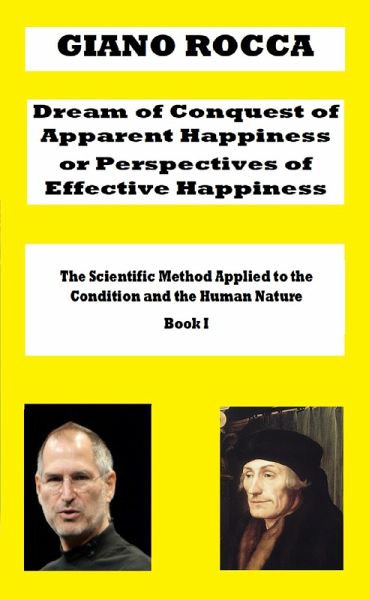
Dream of Conquest of Apparent Happiness or Perspectives of Effective Happiness (The Scientific Method Applied to the Condition and the Human Nature, #1) (eBook, ePUB)

PAYBACK Punkte
0 °P sammeln!
The proposal of a new model of social organization is aimed at all human beings, but it seems difficult for fools or people who are too integrated into the historical structural reality to be convinced of the validity and, above all, of the preferability of the new model of social organization. Therefore, those who join the new type of human society will be individuals, motivated to reach a higher level of civilizing and of moral level.It now appears established, by the physical-mathematical sciences, that the principle of cause and effect does not always appear valid in the physical-cosmic un...
The proposal of a new model of social organization is aimed at all human beings, but it seems difficult for fools or people who are too integrated into the historical structural reality to be convinced of the validity and, above all, of the preferability of the new model of social organization. Therefore, those who join the new type of human society will be individuals, motivated to reach a higher level of civilizing and of moral level.
It now appears established, by the physical-mathematical sciences, that the principle of cause and effect does not always appear valid in the physical-cosmic universe, where the causes assume, in certain cases, the aspect of imponderability and unpredictability.
The societies that have followed, since that form of social structures that historians like to define as "civilization" (or: the various "civilizations") was created, present ever more evident contrasts with the individuals who in those societies are forced to live, contrasts that manifest themselves in their desires, needs, and purposes. These contrasts demonstrate how this type of structure incorporates irrationality, inconsistency, and illogicality, which are in natural contrast with the need for rationality that is of all living beings, but in an even more evident way in the human species, which aspires to realize a general coherence with the principle of cause and effect: that is, an ever greater coherence of reality with one's own aspirations, in terms of satisfaction of needs, desires and the most indispensable individual and social goals. This coherence is not always manifest in contemporary human beings, a good part of which seems to be perfectly suited to structures based on statehood, while a part of contemporaries seems to be even more suited to the structures that have been created in the millennia of evolution psychological, that have preceded the establishment of human societies based on the statehood. In fact, they manifest a degree of irrationality (which is commonly referred to as stupidity, cretinism, incivility, foolishness, and so on) which is not very suitable for societies based on statehood, and even more so with societies with types of power generally defined of the liberal-democratic type, namely a consolidated political democracy.
The concept according to which: "Homo homini lupus", namely the idea that human beings do not possess a natural morality, or that such a morality is not sufficient to allow them to live without a power that dominates them, be it of the type: monocratic, aristocratic or democratic, does not seem to be valid for all contemporary human beings, some of whom seem to have a psychological development such as to allow them to assume the responsibilities necessary to be fully autonomous and self-directed and, therefore, able to manifest a fully rational morality, or coherent with their nature as the individual beings (with the need to fully manifest their individuality, so as to make them feel fully fulfilled) and social beings (with the need to manifest a sociality capable of making them fully happy, in the social relationships they wish to maintain, expanding mutual knowledge: of emotions, feelings, and knowledge). If this sensation proves to be founded, or if it will acquire foundation with future generations, the main human purpose: that of ever greater awareness and an ever more marked human and social progress, on the path of progressive civilizing, will approach its full satisfaction. This implies the creation of a science of sociality that makes it possible to identify, in every individual, his (temperamental, or behavioral) elements of irrationality, to circumscribe and neutralize them, as far as possible, creating a model of social organization devoid of elements extraneous to conscious will of its adherents and their aims.
It now appears established, by the physical-mathematical sciences, that the principle of cause and effect does not always appear valid in the physical-cosmic universe, where the causes assume, in certain cases, the aspect of imponderability and unpredictability.
The societies that have followed, since that form of social structures that historians like to define as "civilization" (or: the various "civilizations") was created, present ever more evident contrasts with the individuals who in those societies are forced to live, contrasts that manifest themselves in their desires, needs, and purposes. These contrasts demonstrate how this type of structure incorporates irrationality, inconsistency, and illogicality, which are in natural contrast with the need for rationality that is of all living beings, but in an even more evident way in the human species, which aspires to realize a general coherence with the principle of cause and effect: that is, an ever greater coherence of reality with one's own aspirations, in terms of satisfaction of needs, desires and the most indispensable individual and social goals. This coherence is not always manifest in contemporary human beings, a good part of which seems to be perfectly suited to structures based on statehood, while a part of contemporaries seems to be even more suited to the structures that have been created in the millennia of evolution psychological, that have preceded the establishment of human societies based on the statehood. In fact, they manifest a degree of irrationality (which is commonly referred to as stupidity, cretinism, incivility, foolishness, and so on) which is not very suitable for societies based on statehood, and even more so with societies with types of power generally defined of the liberal-democratic type, namely a consolidated political democracy.
The concept according to which: "Homo homini lupus", namely the idea that human beings do not possess a natural morality, or that such a morality is not sufficient to allow them to live without a power that dominates them, be it of the type: monocratic, aristocratic or democratic, does not seem to be valid for all contemporary human beings, some of whom seem to have a psychological development such as to allow them to assume the responsibilities necessary to be fully autonomous and self-directed and, therefore, able to manifest a fully rational morality, or coherent with their nature as the individual beings (with the need to fully manifest their individuality, so as to make them feel fully fulfilled) and social beings (with the need to manifest a sociality capable of making them fully happy, in the social relationships they wish to maintain, expanding mutual knowledge: of emotions, feelings, and knowledge). If this sensation proves to be founded, or if it will acquire foundation with future generations, the main human purpose: that of ever greater awareness and an ever more marked human and social progress, on the path of progressive civilizing, will approach its full satisfaction. This implies the creation of a science of sociality that makes it possible to identify, in every individual, his (temperamental, or behavioral) elements of irrationality, to circumscribe and neutralize them, as far as possible, creating a model of social organization devoid of elements extraneous to conscious will of its adherents and their aims.
Dieser Download kann aus rechtlichen Gründen nur mit Rechnungsadresse in A, B, CY, CZ, D, DK, EW, E, FIN, F, GR, H, IRL, I, LT, L, LR, M, NL, PL, P, R, S, SLO, SK ausgeliefert werden.













